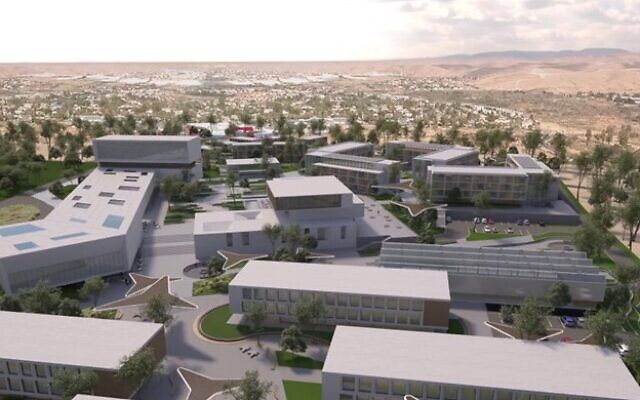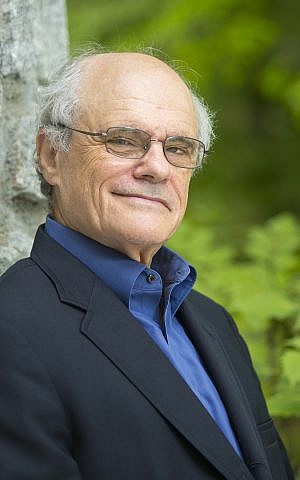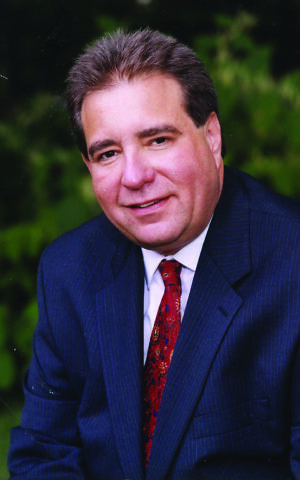JNF Plans Largest Zionist Project for Israel
The $350 million educational World Zionist Village will be built in Beersheva in the Negev.

Atlantans are playing pivotal roles in the newly announced World Zionist Village to be developed in Beersheva by Jewish National Fund-USA over the next few years. A design competition for the $350 million project that will include classrooms, dormitories, conference centers, cafes and houses of worship launched this month and will continue until April 15, Israel’s Independence Day.
A panel of well-known architects and other public figures will judge the competition entries, including Ken Stein, president and founder of the Center for Israel Education in Atlanta. “JNF wants the campus to be a focal point for Jews around the world to learn about Israel,” Stein told the AJT. “I was delighted to be asked.”
Stein will be involved in the World Zionist Village far more than just judging the architectural design competition, whose winner will be announced in June. Also founding director of the Emory University Institute for the Study of Modern Israel, Stein will be immersed in the development of curriculum for the new facility, the main focus of which will be education.

About seven years ago, JNF-USA purchased the Alexander Muss High School in Israel located in Hod Hashron in the center of the country. The new 20-acre World Zionist Village will allow for an expansion of AMHSI from about 1,500 to 5,000 high school students, according to Russell F. Robinson, CEO of JNF-USA. The facility in the Negev desert will also provide educational space for a wide range of gap year programs, post-college internship programs, synagogue groups visiting Israel and adult education.
“The adult learning center will focus on teaching and targeting different Jewish groups around the world,” said Stein, who will serve as chair of the education subcommittee. “They asked me to help them shape the curriculum and content provided to different kinds of targeted audiences.”
Another Atlantan, Sharon Levison, is on the marketing committee for the new project.
Calling the World Zionist Village the “largest Zionist venture” in Israel’s history, Robinson said, “We’re trying to do something that has never been done. This won’t be just a physical place,” although he emphasized the importance of providing dormitories for AMHSI and housing for other groups. He envisions a campus on which diverse Jews coming from “Barcelona to Birmingham, Ala.” can engage in conversations about shared Jewish values.
Robinson said that the ongoing pandemic, which has required people to “meet” through Zoom calls, has “greatly escalated the opportunity” for Jews around the world to talk about their shared destiny. He sees the Village as the next step in that process.
According to Robinson, 25 years ago, 19,300 American teens joined long-term Israel programs of at least four weeks. Now that number is down to 3,000. He partly blamed the Birthright Israel program which, as a free 10-day trip, enticed young people to Israel. Conversely, an 18-week Muss program costs $21,000. He noted, however, that Birthright trips were for college age and older youth, and he emphasized that it’s more important to attract high school students to Israel.
To combat the expense of the high school programs, Robinson added that in three weeks, JNF-USA will be launching a Dream Israel Fund of some $25 million that will provide $7,500 stipends to students attending Muss or for programs offered by the Reform and Conservative movements.
JNF-USA’s focus on its planned World Zionist Village comes as JNF in Israel, known in Hebrew as Keren Kayemeth LeIsrael, approved a controversial change Feb. 14 in its policy to allow the organization to purchase land in the West Bank to expand settlement development there. Until now, all its involvement in settlements was handled unofficially and indirectly through a subsidiary.

The decision, which must be approved by its board of directors – delayed until after the March 23 Israeli elections – is running into strong opposition. Deputy chair of JNF-KKL Alon Tal, told Israeli newspaper Haaretz that it was “highly unfortunate that a proposal with such enormous implications for Israel and [its] diplomatic status has been submitted in such a hasty and inappropriate fashion.”
The decision was also condemned by the Union for Reform Judaism and T’ruah, a rabbinic human rights organization that represents more than 2,000 rabbis and cantors. Both groups say the new policy would violate international law. The U.S. State Department also criticized the decision.
JNF-USA’s Robinson admits that JNF-USA AND JNF-KKL are sometimes conflated in people’s minds. “For the last 20 years, we’ve been separate even as far as donor dollars,” he said. JNF was founded in 1901 to acquire and develop land in pre-state Israel for Jewish use. JNF-USA has been a separate entity since it was incorporated in the United States in 1926. JNF-USA has been recognizable in the American Jewish community through its coin-accepting little blue boxes. These contributions were used in Israel for forestry and water projects in the Galilee and Negev as well as Zionist education.
JNF-KKL in Israel has, however, been used for the tree-planting financed by Jews around the world to memorialize relatives and events.



comments